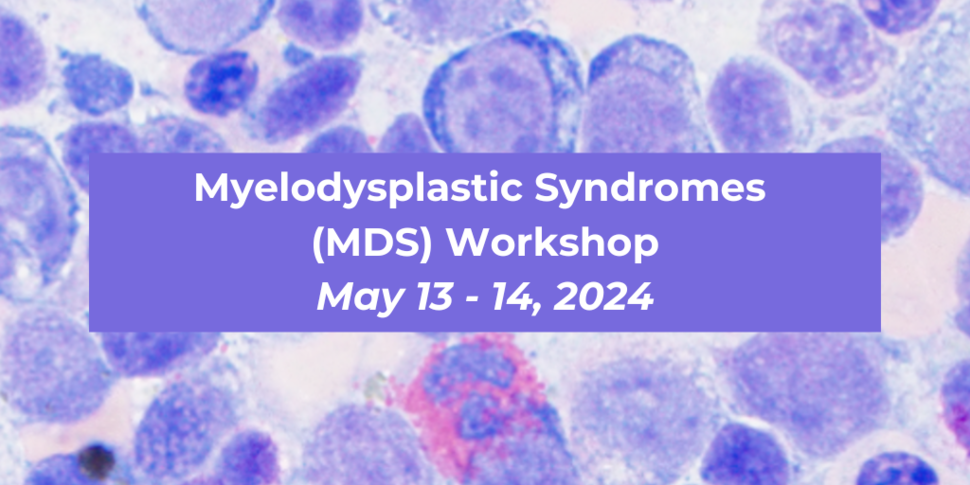Documents from the Workshop
- Agenda
- Participant List
- Speaker Bios
- National MDS Natural History Study: Information and resources from a national clinical trial that aims to improve the way MDS is diagnosed and how it is treated.
Recordings from the Workshop
Introduction to MDS: Gaps and Needs
- Welcoming remarks - Drs. Gosia Klauzinska, Dan Gallahan, and Peter Aplan (NCI)
- Overview of MDS Advances, Gaps, and Needs - Dr. Guillermo Garcia-Manero (MD Anderson)
- TP53 mutated MDS, will we make progress? - Dr. Amer Zeidan (Yale Cancer Center)
- The epichaperome as a biomarker and therapeutic target - Dr. Monica Guzman (Weill Cornell Medicine)
- Mitochondrial heteroplasmy in the development of MDS - Dr. Lukasz Gondek (Johns Hopkins University)
- Targeting unique metabolic vulnerabilities in MDS stem cells: Bench to bedside and back - Dr. Brett Stevens (University of Colorado Anschutz Medical Campus)
- Predicting leukemia evolution and response to treatment by integrating transition state theory, machine learning, and the peripheral blood transcriptome - Dr. Russell Rockne (City of Hope)
Session 2: Genetic Predisposition to MDS
- Germline predisposition to MDS in adults - Dr. Lucy Godley (Northwestern University)
- Germline and somatic drivers of primary pediatric MDS - Dr. Marcin Wlodarski (St. Jude Children's Research Hospital)
- Using large exome sequencing cohorts to evaluate germline MDS predisposition genes - Dr. Lisa McReynolds (NCI)
- Clonal Hematopoiesis and CCUS: Mapping progression risk - Dr. Pinkal Desai (Weill Cornell Medicine)
- DDX41 mutations: Splicing anomalies, cellular stress and MDS - Dr. Tim Chlon (Cincinnati Children's Hospital)
- Inflammatory signaling in MDS - Dr. Daniel Starczynowski (Cincinnati Children's Hospital)
- Pre-leukemic HSCs: Therapeutic targeting and clonal expansion - Dr. Ravi Majeti (Stanford University)
- Building bone marrow - Dr. Brendan Harley (University of Illinois Urbana - Champaign)
- Mechanisms by which the aging microenvironment drives progression of CH to MDS - Dr. Kira Young (Jackson Laboratory)
- Biology and therapeutic targeting of cohesin-mutant myeloid malignancies - Dr. Zuzana Tothova (Dana-Farber Cancer Institute)
Session 4: Development of preclinical models for the discovery and development of new MDS therapies
- Genetically Engineered Mouse (GEM) models for MDS - Dr. Peter Aplan (NCI)
- Modeling niche-clone interactions in vivo: challenges and opportunities - Dr. Laura Calvi (University of Rochester School of Medicine and Dentistry)
- Insights into MDS from human iPSCs - Dr. Eirini Papapetrou (Icahn School of Medicine at Mount Sinai)
- RNA splicing factor mutations in MDS: Do RNA granule perturbations drive clonal advantage? - Dr. Stephanie Halen (Yale School of Medicine)
- Altered RNA export sensitizes to nuclear export inhibition in SF3B1 mutant myelodysplastic syndromes - Dr. Justin Taylor (University of Miami Miller School of Medicine)
- Workshop summary - Dr. Peter Aplan (NCI)
- Final discussion - Workshop Participants
- Closing remarks - Dr. Gosia Klauzinska (NCI)
Social Media Related to the Workshop
Social media posts related to the workshop can be found using #Research4MDS.
DCB Contact for the Workshop
For additional information about the MDS Workshop, please contact Dr. Margaret (Gosia) Klauzinska.
